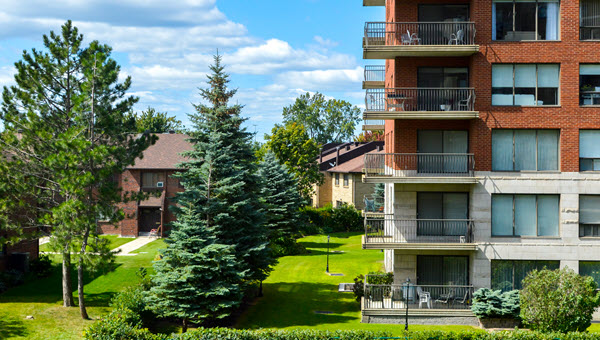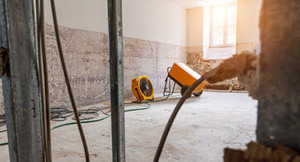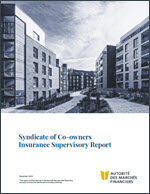Insuring your condo unit and building
A condominium isn’t insured the same way as an apartment or a single-family home. You own a condo unit or are you a director of a syndicate of co-owners? The following information will help you better understand and manage your insurance.
How to insure a condominium
The following text deals with divided co-ownerships. If you are a co-owner of an undivided property, we suggest you contact your insurer to discuss your needs. Your insurer will generally consider you a co-owner of a home rather than the co-owner of a condominium.
Condominiums are covered by two insurance policies
1. The syndicate of co-ownersThe syndicate of co-owners represents all the co-owners and is responsible for the proper administration of the building. is responsible for insuring the building, the common portions and the common property. It must also cover the third-person liability of the syndicate and its directors.
Are you the director of a syndicate of co-owners? Here's what you need to know
2. As a co-owner, you are responsible for insuring your personal belongings, your third person liabilityCivil liability insurance is insurance that can cover the cost of certain types of damage for which the insured may be responsible. For example, if you accidentally set fire to the building where you live or if your dog bites someone. and any improvements* to your condo unit. Your co-owner’s insurance (personal property insurance) covers all these items.
This insurance is partly mandatory. By law, all co-owners must have at least third person liability insurance. They may be required to also hold other forms of coverage under the declaration of co-ownership.

* Here are two examples of improvements:
-
When buying a new condo, you decide to install wooden kitchen cabinets instead of the melamine ones offered by the contractor.
-
When renovating the bathroom, the previous co-owner decided to replace the moulded plastic shower stall with a ceramic one.
Find out what improvements were made to your unit by asking the syndicate for a description of the standard unit.
Key points to verify before shopping for condo insurance
The following key tips will help you shop for co-owner’s insurance (personal property insurance):
Rental condos

You bought a condo unit so you could rent it out (after checking the declaration of co-ownershipThe declaration of co-ownership contains the rules of common living and administration of the condo. to make sure it’s allowed)? You should still purchase landlord insurance (a form of personal property insurance).
By law, all co-owners are required to hold at least third person liability insurance. You may also be required, under the declaration of co-ownership or by your mortgage lender, to maintain coverage for such things as:
- Improvements to your condo unit (see example above)
- Your furniture
- Any loss assessments (special assessments) that may be charged against you
In addition, your tenant may be required, by you or under the by-laws of the property, to take out a personal property insurance policy to cover their liability.
What to do in the event of a loss

Whether you suffer a loss from water damage, fire, theft or another cause, see how you can facilitate the settlement of your claim.
The loss affects a portion of the building or your condo unit? You must inform your syndicate of co-owners. The syndicate is responsible for getting the damage repaired and handling the claim with its insurer.
Are you the director of a syndicate of co-owners? Here's what you need to know
You’re responsible for the loss?
You could be held responsible for the damage caused to the building. If you’ve received a formal demand from the syndicate or another co-owner to pay an amount of money following a loss, notify your insurer. The insurer may take up your defence or provide an amount of money (amount payable) to cover the claim.
The obligations of a syndicate

The obligations of a syndicate are multifold. They include:
- Maintaining the building
- Insuring the condominium as well as third person liability for the following: the syndicate, the directors, the manager, the president and the secretary of the general meeting of the co-owners and the other persons responsible for seeing to its proper conduct
- Having a professional appraise the building
- Establishing a self-insurance fund
- Establishing a contingency fund
- Handling the settlement of claims relating to the building
- Making a description of the standard unit available for the purpose of identifying improvements
- Holding annual general meetings
For a description of all the obligations, refer to Lacopropriete.info This link will open in a new window (in French only), a website created by the Chambre des notaires du Québec.
How to find an insurer for the condo
The syndicate must insure the building, the common portions and common property, including every condo unit (except for improvements). It must also insure the third-person liability of the syndicate and its directors.
The syndicate must deal with a commercial-lines damage insurance agent or broker. Before doing this, always check if they are authorized to offer you insurance.
Once the insurance contract has been entered into, the syndicate must make a copy of the contract available to the co-owners for consultation.
Insurers have become more selective over the years owing to the high volume of claims filed by syndicates.
Well-maintained, well-managed condos with fewer claims are more likely to receive quotes with better terms. It is worth taking preventative steps and minimizing risks by, for example, installing water leak detectors.
Note: The syndicate must notify the insurer of any information that could significantly affect the insurer’s assessment of the risk, including past lossesIn the field of insurance, a loss is damage sustained following an unfavourable event, such as death, illness, fire, accident, etc., regardless of whether a claim was filed for the loss. Not doing so could lead to a reduction in or the cancellation of coverage in the event of a claim.
If you are having difficulty insuring the building, contact the AMF Information Centre to find out what options are available to you.
Is your representative or firm authorized to offer you a home insurance product?
- Consult the Register of firms and individuals authorized to practice
- Contact our Information Centre
- Submit a Request for information
This link will open in a new window
Mandatory appraisals (evaluations) of all condo buildings, no matter the size
By law, the syndicate of co-owners is required to have the reconstruction cost of the building assessed (evaluated) every five years by a chartered appraiser who is a member in good standing of the Ordre des évaluateurs agréés du Québec This link will open in a new window, regardless of the building’s size, to ensure that the insurance amount covers reconstruction of the entire building.

The self-insurance fund and why you are required to establish one
Every syndicate will have to have a self-insurance fund in place. A self-insurance fund is used to pay the deductibles specified in the syndicate’s insurance contract. The fund may also be used to cover damage to the syndicate’s insured property when the insurance payment is not sufficient to do so or there is not enough money in the contingency fund. The syndicate collects the needed amounts from the condo owners through their condo fees.
The co-owners’ contribution to the fund is determined as followsThe deductible for damage caused by an earthquake or by flooding must be excluded when determining the co-owners’ contribution to the fund. Also, this amount determined in this way is the minimum contribution required by law. A syndicate may ask for higher contributions.:
- If the amount accumulated in the fund is greater than or equal to the highest deductible amount, no contribution will be required from the co-owners for the current year.
- If the accumulated amount is greater than 50% of the highest deductible, then the contribution from the co-owners for the year will be the difference between that deductible and the accumulated amount. For example, if the deductible is $40,000 and the amount accumulated in the self-insurance fund is $30,000, the amount to be paid into the fund will be $10,000.
-
If the accumulated amount is less than or equal to 50% of the highest deductible amount, then the contribution for the year will be 50% of that deductible. For example, if the deductible amount is $40,000 and the amount accumulated in the self-insurance fund is $5,000, the amount to be paid into the fund will be $20,000.
However, if the co-owners’ minimum contribution to the self-insurance fund brings the amount in the fund to more than $100,000, the contribution may be reduced so that the amount in the fund is at least $100,000. For example, if the deductible amount is $500,000 and the amount accumulated in the self-insurance fund is $90,000, the co-owners will need to contribute a minimum of $10,000. However, the co-owners could decide to contribute more than this amount.
- If the syndicate is required to draw on the fund following a loss, the co-owners will then have to contribute again in accordance with the above criteria. It could therefore take one to two years to replenish the fund, provided nothing else happens that requires its use.
The standard condo unit
This is the condo unit as it was originally built, i.e., the layout for each condo before improvements were made by a co-owner. It is also called the reference unit.
The syndicate must include a description of the standard unit in the co-ownership register. This description makes it easier to determine:
- What the syndicate is required to insure (standard unit)
- What each co-owner is required to insure (improvements)
What to do in the event of a loss affecting the building

The syndicate must report the loss to its insurer as soon as it becomes aware of it, even if the syndicate doesn’t intend to file a claim.
The syndicate must also see that the damage is repaired. If it decides to file a claim with the insurer, then the insurer will manage the claim.
This obligation rests with the syndicate even if just one co-owner is affected by the loss. The syndicate cannot relieve itself of its responsibility by asking the co-owner to resolve the situation.
Items covered by each insurance contract
| Syndicate’s insurance | Co-owner’s insurance |
|---|---|
|
|
Where one of the co-owners is responsible for the loss
A few options are available to the syndicate.
If the syndicate chooses to file a claim with its insurer, there are two possible outcomes:
- Outcome A: The loss is covered by the insurance contract on the building.
The syndicate may ask the co-owner at fault to pay the amount of the deductible specified in the syndicate’s policy and the cost of the work in excess of the insurance limits. The co-owner may then file a claim for these amounts with their own personal property insurer, which will evaluate it. - Outcome B: The loss is not covered by the building insurance contract.
The syndicate will have to assume the total cost of the work. It may then claim the cost from the co-owner at fault. The co-owner may file a claim for that amount with their own personal property insurer, which will evaluate it.
If the syndicate chooses not to file a claim with its insurer:
- It will have to assume the cost of the work. To do this, it will be able to use its contingency fund and self-insurance fund (if the contingency fund is insufficient to cover the total cost of the work) and/or apportion the cost among all the co-owners through a special assessment.
- The syndicate may claim the amount of its deductible from the co-owner at fault. It may also claim the cost of the work in excess of the insurance limits specified in its contract. However, it cannot ask the co-owner to pay for damage that would have been covered by its insurer.
In all cases, both the syndicate and the co-owner at fault must report the loss to their insurers.
Alix’s aquarium causes water damage

The aquarium in Alix’s condo unit shattered, causing damage to the floor* of the unit below hers. The syndicate is insured for this type of damage. The deductible is $1,000. The syndicate chooses not to file a claim with its insurer. It is aware that it must assume the cost of repairs, which amounts to $3,500.
The syndicate considers Alix responsible for the damage. It is not allowed to claim the total amount of $3,500 from Alix, since that amount would have been covered by the syndicate’s insurer. Nevertheless, the syndicate could claim the $1,000 deductible imposed by its insurer from Alix.
If Alix’s insurer, after assessing her liability, agrees to compensate the syndicate for the amount of the deductible ($1,000), the syndicate will have to assume the remaining $2,500, which it could collect from the owners through a special assessment.
*For the purpose of this example, the damaged floor is included in the description of the reference condo unit as it appears in the register of the syndicate.
How to insure a condominium
The following text deals with divided co-ownerships. If you are a co-owner of an undivided property, we suggest you contact your insurer to discuss your needs. Your insurer will generally consider you a co-owner of a home rather than the co-owner of a condominium.
Condominiums are covered by two insurance policies
1. The syndicate of co-ownersThe syndicate of co-owners represents all the co-owners and is responsible for the proper administration of the building. is responsible for insuring the building, the common portions and the common property. It must also cover the third-person liability of the syndicate and its directors.
Are you the director of a syndicate of co-owners? Here's what you need to know
2. As a co-owner, you are responsible for insuring your personal belongings, your third person liabilityCivil liability insurance is insurance that can cover the cost of certain types of damage for which the insured may be responsible. For example, if you accidentally set fire to the building where you live or if your dog bites someone. and any improvements* to your condo unit. Your co-owner’s insurance (personal property insurance) covers all these items.
This insurance is partly mandatory. By law, all co-owners must have at least third person liability insurance. They may be required to also hold other forms of coverage under the declaration of co-ownership.

* Here are two examples of improvements:
-
When buying a new condo, you decide to install wooden kitchen cabinets instead of the melamine ones offered by the contractor.
-
When renovating the bathroom, the previous co-owner decided to replace the moulded plastic shower stall with a ceramic one.
Find out what improvements were made to your unit by asking the syndicate for a description of the standard unit.
Key points to verify before shopping for condo insurance
The following key tips will help you shop for co-owner’s insurance (personal property insurance):
Rental condos

You bought a condo unit so you could rent it out (after checking the declaration of co-ownershipThe declaration of co-ownership contains the rules of common living and administration of the condo. to make sure it’s allowed)? You should still purchase landlord insurance (a form of personal property insurance).
By law, all co-owners are required to hold at least third person liability insurance. You may also be required, under the declaration of co-ownership or by your mortgage lender, to maintain coverage for such things as:
- Improvements to your condo unit (see example above)
- Your furniture
- Any loss assessments (special assessments) that may be charged against you
In addition, your tenant may be required, by you or under the by-laws of the property, to take out a personal property insurance policy to cover their liability.
What to do in the event of a loss

Whether you suffer a loss from water damage, fire, theft or another cause, see how you can facilitate the settlement of your claim.
The loss affects a portion of the building or your condo unit? You must inform your syndicate of co-owners. The syndicate is responsible for getting the damage repaired and handling the claim with its insurer.
Are you the director of a syndicate of co-owners? Here's what you need to know
You’re responsible for the loss?
You could be held responsible for the damage caused to the building. If you’ve received a formal demand from the syndicate or another co-owner to pay an amount of money following a loss, notify your insurer. The insurer may take up your defence or provide an amount of money (amount payable) to cover the claim.
The obligations of a syndicate

The obligations of a syndicate are multifold. They include:
- Maintaining the building
- Insuring the condominium as well as third person liability for the following: the syndicate, the directors, the manager, the president and the secretary of the general meeting of the co-owners and the other persons responsible for seeing to its proper conduct
- Having a professional appraise the building
- Establishing a self-insurance fund
- Establishing a contingency fund
- Handling the settlement of claims relating to the building
- Making a description of the standard unit available for the purpose of identifying improvements
- Holding annual general meetings
For a description of all the obligations, refer to Lacopropriete.info This link will open in a new window (in French only), a website created by the Chambre des notaires du Québec.
How to find an insurer for the condo
The syndicate must insure the building, the common portions and common property, including every condo unit (except for improvements). It must also insure the third-person liability of the syndicate and its directors.
The syndicate must deal with a commercial-lines damage insurance agent or broker. Before doing this, always check if they are authorized to offer you insurance.
Once the insurance contract has been entered into, the syndicate must make a copy of the contract available to the co-owners for consultation.
Insurers have become more selective over the years owing to the high volume of claims filed by syndicates.
Well-maintained, well-managed condos with fewer claims are more likely to receive quotes with better terms. It is worth taking preventative steps and minimizing risks by, for example, installing water leak detectors.
Note: The syndicate must notify the insurer of any information that could significantly affect the insurer’s assessment of the risk, including past lossesIn the field of insurance, a loss is damage sustained following an unfavourable event, such as death, illness, fire, accident, etc., regardless of whether a claim was filed for the loss. Not doing so could lead to a reduction in or the cancellation of coverage in the event of a claim.
If you are having difficulty insuring the building, contact the AMF Information Centre to find out what options are available to you.
Is your representative or firm authorized to offer you a home insurance product?
- Consult the Register of firms and individuals authorized to practice
- Contact our Information Centre
- Submit a Request for information
This link will open in a new window
Mandatory appraisals (evaluations) of all condo buildings, no matter the size
By law, the syndicate of co-owners is required to have the reconstruction cost of the building assessed (evaluated) every five years by a chartered appraiser who is a member in good standing of the Ordre des évaluateurs agréés du Québec This link will open in a new window, regardless of the building’s size, to ensure that the insurance amount covers reconstruction of the entire building.

The self-insurance fund and why you are required to establish one
Every syndicate will have to have a self-insurance fund in place. A self-insurance fund is used to pay the deductibles specified in the syndicate’s insurance contract. The fund may also be used to cover damage to the syndicate’s insured property when the insurance payment is not sufficient to do so or there is not enough money in the contingency fund. The syndicate collects the needed amounts from the condo owners through their condo fees.
The co-owners’ contribution to the fund is determined as followsThe deductible for damage caused by an earthquake or by flooding must be excluded when determining the co-owners’ contribution to the fund. Also, this amount determined in this way is the minimum contribution required by law. A syndicate may ask for higher contributions.:
- If the amount accumulated in the fund is greater than or equal to the highest deductible amount, no contribution will be required from the co-owners for the current year.
- If the accumulated amount is greater than 50% of the highest deductible, then the contribution from the co-owners for the year will be the difference between that deductible and the accumulated amount. For example, if the deductible is $40,000 and the amount accumulated in the self-insurance fund is $30,000, the amount to be paid into the fund will be $10,000.
-
If the accumulated amount is less than or equal to 50% of the highest deductible amount, then the contribution for the year will be 50% of that deductible. For example, if the deductible amount is $40,000 and the amount accumulated in the self-insurance fund is $5,000, the amount to be paid into the fund will be $20,000.
However, if the co-owners’ minimum contribution to the self-insurance fund brings the amount in the fund to more than $100,000, the contribution may be reduced so that the amount in the fund is at least $100,000. For example, if the deductible amount is $500,000 and the amount accumulated in the self-insurance fund is $90,000, the co-owners will need to contribute a minimum of $10,000. However, the co-owners could decide to contribute more than this amount.
- If the syndicate is required to draw on the fund following a loss, the co-owners will then have to contribute again in accordance with the above criteria. It could therefore take one to two years to replenish the fund, provided nothing else happens that requires its use.
The standard condo unit
This is the condo unit as it was originally built, i.e., the layout for each condo before improvements were made by a co-owner. It is also called the reference unit.
The syndicate must include a description of the standard unit in the co-ownership register. This description makes it easier to determine:
- What the syndicate is required to insure (standard unit)
- What each co-owner is required to insure (improvements)
What to do in the event of a loss affecting the building

The syndicate must report the loss to its insurer as soon as it becomes aware of it, even if the syndicate doesn’t intend to file a claim.
The syndicate must also see that the damage is repaired. If it decides to file a claim with the insurer, then the insurer will manage the claim.
This obligation rests with the syndicate even if just one co-owner is affected by the loss. The syndicate cannot relieve itself of its responsibility by asking the co-owner to resolve the situation.
Items covered by each insurance contract
| Syndicate’s insurance | Co-owner’s insurance |
|---|---|
|
|
Where one of the co-owners is responsible for the loss
A few options are available to the syndicate.
If the syndicate chooses to file a claim with its insurer, there are two possible outcomes:
- Outcome A: The loss is covered by the insurance contract on the building.
The syndicate may ask the co-owner at fault to pay the amount of the deductible specified in the syndicate’s policy and the cost of the work in excess of the insurance limits. The co-owner may then file a claim for these amounts with their own personal property insurer, which will evaluate it. - Outcome B: The loss is not covered by the building insurance contract.
The syndicate will have to assume the total cost of the work. It may then claim the cost from the co-owner at fault. The co-owner may file a claim for that amount with their own personal property insurer, which will evaluate it.
If the syndicate chooses not to file a claim with its insurer:
- It will have to assume the cost of the work. To do this, it will be able to use its contingency fund and self-insurance fund (if the contingency fund is insufficient to cover the total cost of the work) and/or apportion the cost among all the co-owners through a special assessment.
- The syndicate may claim the amount of its deductible from the co-owner at fault. It may also claim the cost of the work in excess of the insurance limits specified in its contract. However, it cannot ask the co-owner to pay for damage that would have been covered by its insurer.
In all cases, both the syndicate and the co-owner at fault must report the loss to their insurers.
Alix’s aquarium causes water damage

The aquarium in Alix’s condo unit shattered, causing damage to the floor* of the unit below hers. The syndicate is insured for this type of damage. The deductible is $1,000. The syndicate chooses not to file a claim with its insurer. It is aware that it must assume the cost of repairs, which amounts to $3,500.
The syndicate considers Alix responsible for the damage. It is not allowed to claim the total amount of $3,500 from Alix, since that amount would have been covered by the syndicate’s insurer. Nevertheless, the syndicate could claim the $1,000 deductible imposed by its insurer from Alix.
If Alix’s insurer, after assessing her liability, agrees to compensate the syndicate for the amount of the deductible ($1,000), the syndicate will have to assume the remaining $2,500, which it could collect from the owners through a special assessment.
*For the purpose of this example, the damaged floor is included in the description of the reference condo unit as it appears in the register of the syndicate.
What the AMF can do for you
The AMF provides assistance services relating to condo building insurance and co-owner’s insurance (personal home insurance). Specifically, we offer:
- An information telephone service
- Assistance with any issues you may have in getting your complaint processed by an insurer or an insurance broker
- Conciliation or mediation services, where appropriate

 (pdf - 577 KB)
(pdf - 577 KB)